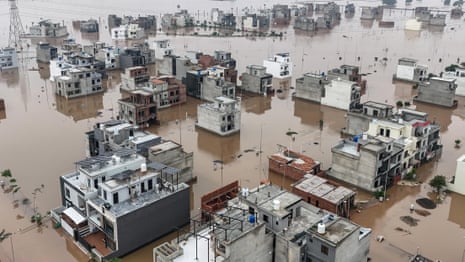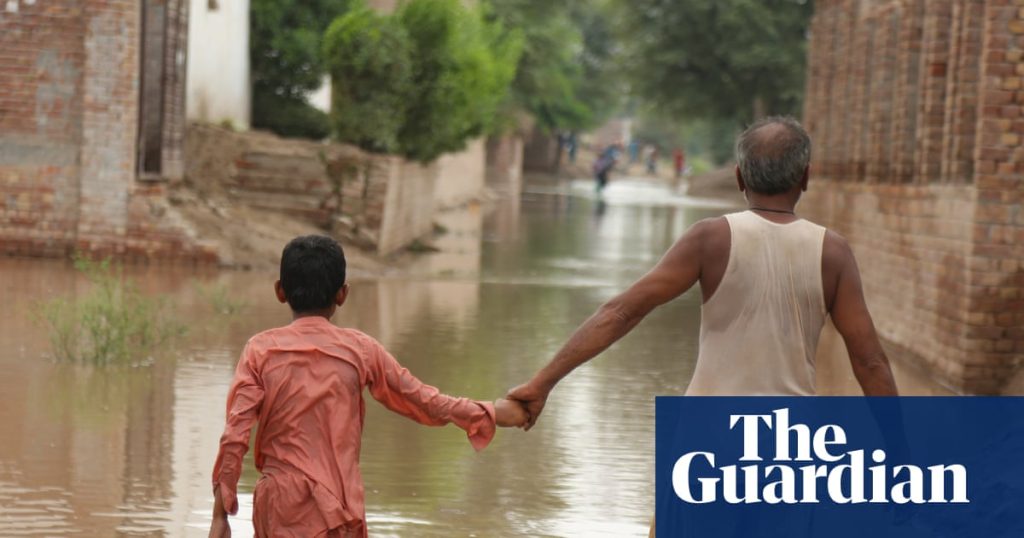For days, farmers in the Indian state of Punjab watched the pounding monsoon rains fall and the rivers rise with mounting apprehension. By Wednesday, many woke to find their fears realised as the worst floods in more than three decades ravaged their farms and decimated their livelihoods.
Hundreds of thousands of acres of bright green rice paddies – due to be harvested imminently – as well as crops of cotton and sugar cane were left destroyed as they became fully submerged in more than five feet of muddy brown flood waters. The bodies of drowned cattle littered the ground.
“The crops are ruined, and even our homes are in danger of collapsing,” said Parmpreet Singh, 52, a farmer from Ajnala in Amritsar district, Punjab. His family, including his elderly mother and two young children, were now living on the roof of their house to stay safe from the murky flood waters.
“My entire livelihood depends on my seven hectares of farmland, all of which has been destroyed by flood waters,” he said, despairing that his only option left would be to sell his land and abandon farming. “I had already invested most of my money into seeds and fertilisers for the previous crop. Now everything is gone.”
While monsoon season usually brings heavy rain, the extreme levels of rainfall that fell across northern India this week caused untold damage in Punjab, resulting in flash floods and swollen rivers breaching their banks and overflowing into fields and villages. So far, 43 people have lost their lives and almost 2,000 villages in the state have been affected, leaving hundreds of thousands of people without electricity and access to clean water. The stench of rotting animal carcasses hangs over many villages.
“This is the worst time Punjab has ever faced,” said Parminder Singh Pinki, a lawmaker from Firozpur district in western Punjab, one of the areas badly hit by floods.
“I have never witnessed such devastation in my lifetime. Entire farmlands are submerged under water, now layered with mud and sand.”
India’s farmers have already faced mounting hardship, with millions saddled with high debts, low incomes and heavy crop losses in the face of increasingly extreme and unpredictable weather conditions brought on by the climate crisis.
Pinki was among those who accused the ruling Bharatiya Janata party (BJP) government, led by Narendra Modi, of negligence towards farmers and simply abandoning them to their fate during this year’s extreme monsoon.
“The government had been aware for months about the weather forecasts and should have put proper measures and emergency responses in place,” he said. “But that never happened, and this failure has led to destruction on such a massive scale.”
He was echoed by Surinder Singh, 75, a farmer from Sarala Kalan village in Patiala. For days, he had watched the canal near to their village getting higher and higher, but had been powerless to stop it.
“The government will make promises of relief, but the farmers will end up receiving nothing,” he said. “In the end, we are left to take care of ourselves.” Like many, he questioned the long-term viability of Indian agriculture, which employs half the country’s workforce and keeps food on the country’s tables.
“I cannot imagine what is left for our future generations,” he said. “Floods and extreme weather events are becoming more frequent, and the future does not look any better. If the farmers of Punjab – the food bowl of India – cannot even feed themselves, how will they feed others?”
This crisis has not been India’s alone. Across the border, in Pakistan’s agriculture-heavy province also called Punjab, the devastation caused by floods has been even more catastrophic, with almost 2 million people evacuated and about 4,000 villages submerged in flood waters.
The planet’s most important stories. Get all the week’s environment news – the good, the bad and the essential
Privacy Notice: Newsletters may contain information about charities, online ads, and content funded by outside parties. If you do not have an account, we will create a guest account for you on theguardian.com to send you this newsletter. You can complete full registration at any time. For more information about how we use your data see our Privacy Policy. We use Google reCaptcha to protect our website and the Google Privacy Policy and Terms of Service apply.
after newsletter promotion
The two countries share several major rivers and the Indian government’s decision to release water from several heavily filled dams upstream has led to further flooding on both sides of the border in the geographical region of Punjab, prompting Pakistani officials to try to blame India for the disaster.
Such was the fury of the overflowing Ravi River, which runs through the border of India into Pakistan, that on Friday it ripped down 30km of iron fencing that forms the highly militarised border between the two conflicting neighbours, and forced India’s border security force soldiers to abandon dozens of their highly sensitive posts.
Maratab Ali Gondal, a farmer from Mandi Bahauddin district in Pakistani Punjab, said the rising levels of the Chenab River, which also flows from India, had washed away 90 acres of his crops, including rice and sugar cane, causing losses of millions of rupees.
Gondal said he had spent the previous months begging local officials to build embankments along the river, which would protect farmland, but nothing had been done. “The water erosion has taken all of my land. There is flood water everywhere now. This is not the fault of India; it was [Pakistani] Punjab government negligence which swept away my farmland,” he said.
He added: “This is not only my story – our farmers have been witnessing the worst time in the country’s history.”

It was not only farmland that was affected. Residents of the highly affluent housing development Park View Society in Lahore, recently constructed just a few hundred metres away from the bank of the Ravi, also found their multimillion-rupee homes filled with murky flood water. Experts said that rapid deforestation and development along the waterways was only worsening the likelihood of floods in the area.
Umar, a resident who moved to the development this year, said his home had been filled with five feet of river water. “Many of us have invested our life savings in buying or constructing a dream house here,” he said. “But how could they be allowed to build it if it is at such risk of flooding?”
Maryam Nawaz Sharif, the chief minister of Pakistani Punjab, who is also the niece of Pakistan’s prime minister, Shehbaz Sharif, was accused of doing little to help those affected by the flooding. In a social media post, she highlighted how portable toilets were being installed at a relief camp to help the displaced – however, the image she shared was revealed to be from two years ago.

